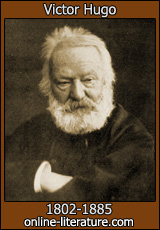 Subscribe for ad free access & additional features for teachers. Authors: 267, Books: 3,607, Poems & Short Stories: 4,435, Forum Members: 71,154, Forum Posts: 1,238,602, Quizzes: 344
Subscribe for ad free access & additional features for teachers. Authors: 267, Books: 3,607, Poems & Short Stories: 4,435, Forum Members: 71,154, Forum Posts: 1,238,602, Quizzes: 344
Chapter 54
OATHS OF SCIENTIFIC AND LITERARY MEN
Here is a priceless detail: M. Bonaparte was desirous that Arago should take the oath. Understand,--astronomy must swear fealty. In a well-regulated state, like France or China, everything is bureaucracy, even science. The mandarin of the Institute depends upon the mandarin of the police. The great parallactic telescope owes homage to M. Bonaparte. An astronomer is a sort of constable of the heavens. The observatory is like any sentry-box. It is necessary to keep an eye on the good God up yonder, who seems sometimes not to submit absolutely to the Constitution of the 14th of January. The heavens are full of unpleasant allusions, and require to be kept in order. The discovery of a new spot on the sun is evidently a case for the censorship. The prediction of a high tide may be seditious. The announcement of an eclipse of the moon may be treason. We are a bit moonstruck at the �lys�e. Free astronomy is almost as dangerous as a free press. Who can tell what takes place in those nocturnal t�te-�-t�tes between Arago and Jupiter? If it were M. Leverrier, well and good!--but a member of the Provincial Government! Beware, M. de Maupas! the Bureau of Longitude must make oath not to conspire with the stars, and especially with those mad artisans of celestial coups d'�tats which are called comets.
Then, too, as we have already said, one is a fatalist when one is a Bonaparte. Napoleon the Great had his star, Napoleon the Little ought surely to have a nebula; the astronomers are certainly something of astrologers. So take the oath, gentlemen. It goes without saying that Arago refused.
One of the virtues of the oath to Louis Bonaparte is that, according as it is refused or taken, that oath gives you or takes from you merits, aptitudes, talents. You are a professor of Greek or Latin; take the oath, or you are deprived of your chair, and you no longer know Greek or Latin. You are a professor of rhetoric; take the oath, or tremble; the story of Theramenes and the dream of Athalie are interdicted; you shall wander about them for the rest of your days, and never again be permitted to enter. You are a professor of philosophy; take the oath to M. Bonaparte,--if not, you become incapable of understanding the mysteries of the human conscience, and of explaining them to young men. You are a professor of medicine; take the oath,--if not, you no longer know how to feel the pulse of a feverish patient. But if the good professors depart, will there be any more good pupils? Particularly in medicine, this is a serious matter. What is to become of the sick? The sick? as if we cared about the sick! The important thing is that medicine should take the oath to M. Bonaparte. For it comes to this: either the seven million five hundred thousand votes have no sense, or it is evident that it would be better to have your leg amputated by an ass who has taken the oath, than by a refractory Dupuytren.
Ah! one would fain jest, but all this makes the heart sad. Are you a young and generous spirit, like Deschanel; a sane and upright intellect, like Despois; a serious and powerful mind, like Jacques; an eminent writer, a popular historian, like Michelet--take the oath, or die of hunger.
They refuse! The darkness and silence, in which they stoically seek refuge, know the rest.
| Art of Worldly Wisdom Daily In the 1600s, Balthasar Gracian, a jesuit priest wrote 300 aphorisms on living life called "The Art of Worldly Wisdom." Join our newsletter below and read them all, one at a time. |
Sonnet-a-Day Newsletter Shakespeare wrote over 150 sonnets! Join our Sonnet-A-Day Newsletter and read them all, one at a time. |
